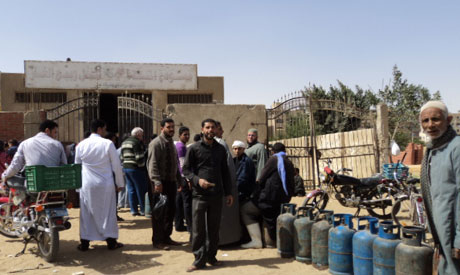
Consumers at depot await latest butane gas delivery (Photo: Bassem Abo Alabass)
The price of subsidised cooking gas canisters will increase substantially starting Monday, according to a spokesperson for the supply ministry.
Nasser El-Farrash told Ahram Online that the 12.5 kg butane cylinder would now be sold at LE8 (roughly $1.17), rising 60 percent from the previous price of LE5 ($0.73).
The move is the implementation of the governmental decision was taken in December of last year, which mandated that subsidised cylinders be available only to citizens who have a "supply card" which is also used to obtain subsidised foodstuffs such as sugar and flour.
Egypt imports more than 50 percent of its butane, mainly from Libya and Saudi Arabia. It is bottled locally then sold at subsidised cost to householders, hotels and restaurants.
Raising butane prices is one of the government’s steps to reign in its subsidy bill, in an attempt to meet the International Monetary Fund’s pre-conditions to secure a long-awaited $4.8 billion loan.
The subsidy bill during the current 2012/13 fiscal year stands at approximately LE146 billion ($21.4 billion) according to official data, with the biggest quota, that for fuel, reaching LE70 billion ($10.2 billion).
According to statistics mentioned in parliament, around 4.5 million households have piped natural gas while some 12 million Egyptian homes use canisters. During winter, shortages become the norm. Usually in March, the supply line eases, although this year it has not.
In March, the Egyptian planning and international cooperation minister announced that the government would start implementing a "smart card" system to sell subsidised petrol to government vehicles in May 2013 and to private cars in July.
Under the new system, vehicles with smaller engines (1,600cc or smaller) will be assigned an annual 1,800 litres at the subsidised price. If consumption exceeds this amount, motorists will have to buy petrol at market prices. Cars with larger engines will not be assigned any subsidised fuel.
Short link: